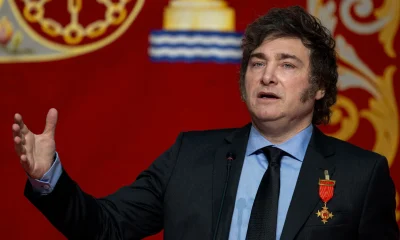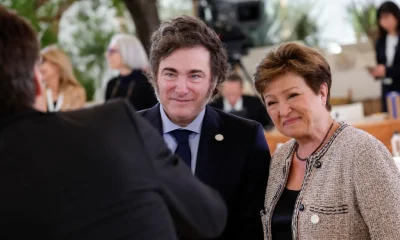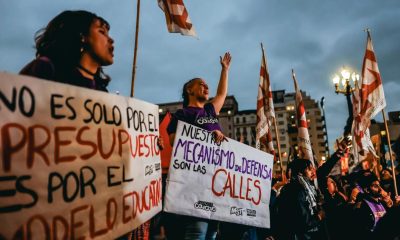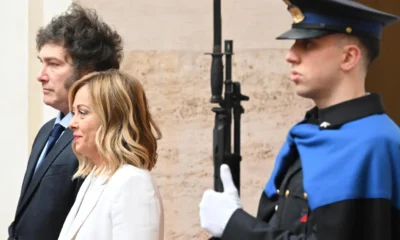International
Justice in Argentina suspends President Javier Milei’s labor reform, but the government appeals and doubts about its validity grow
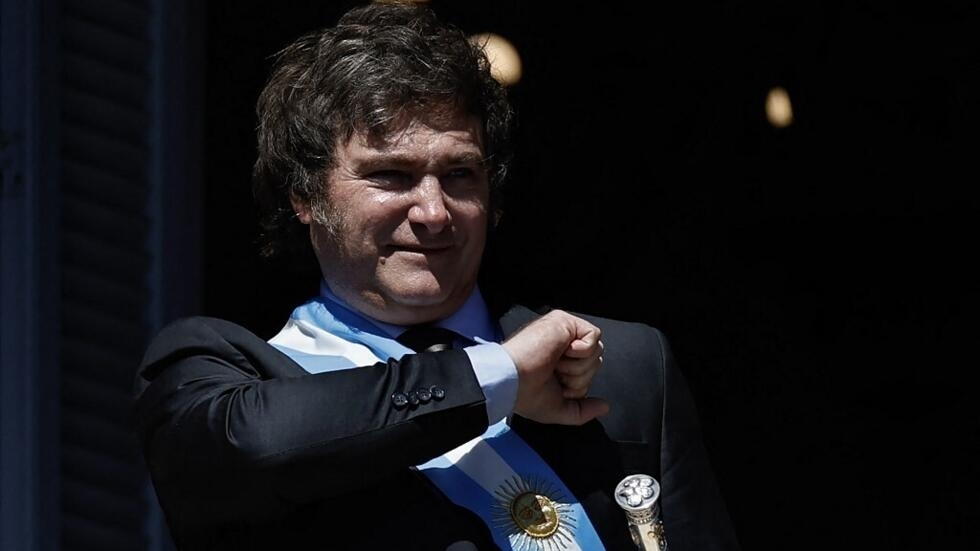
In Argentina, an appeals court suspended the labor reform contained in President Javier Milei’s decree of necessity and urgency (DNU) No. 70/2023. While the government prepares to appeal the decision, the execution of measures related to the labor aspect included in the decree is temporarily halted.
The Labor Appeals Chamber considered that “the ‘necessity’ of adopting so many measures would not be objectively evident,” according to the document signed by two judges of the Chamber, José Alejandro Sudera and Andrea García Vior. A third magistrate, María Dora González, dissented, stating that the court does not have jurisdiction, and the case should be transferred to the administrative litigation court.
The ruling states that there are no reasons alleged that constitute an urgency “to avoid the proper intervention of the Legislative Power regarding substantive legislation.” The tribunal cited the Constitution emphatically: “The National Constitution does not allow choosing discretionary between passing a law or imposing certain material contents more quickly through a decree.”
Now, what does the labor chapter of DNU 70/2023, currently suspended by the justice, establish? Regarding this, there are two main issues that have generated controversy:
- 8-month probation period The DNU extends the probationary period in an indefinite-term employment contract from 3 to 8 months, stating that “it will be considered probationary during the first 8 months of validity.” Additionally, the decree states that “either party may terminate the relationship during that period, without cause and without the right to compensation.”
Labor lawyer Alexander Rodríguez sees this point of the decree as a solution that “should be positive, as it encourages the entry of workers.” According to him, “companies do not hire personnel justifying that labor law is too demanding. So, instead of facilitating the entry of workers, their exit is facilitated. If the probation period is extended, there would be no fines for undeclared work or withheld contributions. Therefore, if you want more staff, you should facilitate entry, not exit.”
In contrast, labor lawyer Leandro Recalde argues that “the probationary period is a time granted to the employer to assess the suitability of the employee and gives them the possibility to terminate the employment relationship once that period is over, without the possibility of paying compensation.” Recalde asks, “How much time is really necessary to assess the employee’s suitability? What they are trying to do with this decree is distort that probationary period to eliminate or degrade the compensatory institute.”
- Severance pay Milei’s DNU states: “In cases of dismissal without just cause by the employer, with or without prior notice, and after the probationary period has elapsed, the employer must pay the worker severance pay equivalent to one month’s salary for each year of service or fraction exceeding 3 months, taking as a basis for calculation the best monthly, normal, and habitual remuneration earned during the last year or during the time of service if less.”
In this regard, Recalde considers that the basic objective of the DNU is to “lower the amount of severance pay.” In this aspect, he emphasized: “The DNU reduces the compensation by attacking how the remuneration or the calculation base for compensation is calculated. That is, if the Labor Contract Law took the best monthly, normal, and habitual remuneration, the DNU excludes the Christmas bonus, semi-annual and annual bonuses, and, in the case of variable remuneration, the best remuneration is not taken, but an average.”
Labor Secretary Omar Yasin declared weeks ago on the news channel La Nación + (LN+) that the DNU “is truly an instrument to generate employment” and that “it does not reduce any worker’s rights.” Regarding severance pay, Yasin argued that the DNU includes “an objective cause for dismissal, which is participating in a block against an employer, causing damage to the employer, the company, or third parties, and, fundamentally, preventing a worker from going to his workplace and not adhering to the strike.”
A topic that has generated controversies and disagreements among different representatives of labor law has to do with the unemployment fund. In statements to LN+, Yasin stated that “another positive aspect of the DNU is the possibility of creating an unemployment fund or termination fund.” As the head of the Labor Secretary established, the termination fund is created by collective agreement. The worker will turn to that fund if dismissed to immediately collect compensation without delay.
“The most serious thing that the decree provides is the possibility that through collective bargaining, unions and business chambers can repeal the compensation system and create series funds that do not adequately protect against dismissal,” argues Recalde. From another perspective, labor lawyer Alexander Rossi maintains that the indemnity resolution by collective agreement “does not make sense” because each business and union sector will have its own agreement.
Yasin also stated that the new DNU generates compensation for discriminatory dismissal, considering sexual, ethnic, or religious orientation. In this regard, the head of the Labor Secretary argued that, in these cases, compensations increase by 50% or 100%, according to judges.
Hours after the news of the suspension of the labor reform included in the DNU became known, it was reported that the State would appeal the precautionary measure. According to a source from the Ministry of Justice of the Nation, the presentation was being prepared by the Treasury Solicitor’s Office of the Nation, led by Rodolfo Barra, a former judge of the Supreme Court. In this regard, the Ministry argues: “They are ignoring the criterion adopted by all other courts in the country, both in the city and in the interior, which sent the case to the natural and universal judge.”
Barra said this Wednesday in an interview on Radio con vos that “the National Labor Appeals Chamber has a bias identified with some sectors that could have been affected by the DNU, which acted outside its jurisdiction.” The Treasury Solicitor anticipated that they will take the discussion first “in the administrative litigation court,” and if they are not successful, they will go to the Supreme Court.
Now, is the precautionary measure annulled with the appeal? For labor law specialist Jorge Fontán, the State required a “reconsideration appeal” for the same appeals chamber to review the precautionary measure. In this way, Fontán explained, “After the review, that appeal goes to the Supreme Court.” The Supreme Court will deal with all precautionary measures, but when the judicial recess or vacation, during which judicial activities cease between January 1 and 31 in Argentina, ends. In fact, the court that granted the precautionary measure is a holiday court. So, as Fontán said, the Supreme Court will deal with all precautionary measures when the judicial recess ends. In this way, given that the precautionary measure does not have a suspensive effect, it remains in force according to Fontán.
For labor lawyer Alexander Rodríguez, there are two scenarios: on the one hand, the decree remains suspended until the Supreme Court says otherwise. On the other hand, “A direct presentation of the Executive Power to the Supreme Court is possible, to immediately resolve the issue due to institutional gravity.”
International
Football Fan Killed in Clashes After Colombian League Match

Fans of Cúcuta Deportivo and their traditional rivals Atlético Bucaramanga clashed outside the stadium following their local league match on Tuesday, leaving one supporter dead and several others injured.
The deceased fan was stabbed, according to a senior police official in Cúcuta who confirmed the cause of death in a video statement. Local media reported that the victim was a supporter of the visiting team, Atlético Bucaramanga.
The match ended in a 2-2 draw. Authorities had banned the entry of Atlético Bucaramanga’s organized supporters into the stadium in an effort to prevent disturbances.
Despite the restrictions, violence broke out in the surrounding areas after the game. Among the injured were three police officers, an institutional source told AFP.
The incident adds to a series of recent violent episodes linked to Colombian football. The most recent occurred in December, when supporters of Atlético Nacional and Independiente Medellín clashed in the stands and on the pitch, leaving 59 people injured.
International
Missing Spanish Sailor Rescued After 11 Days Adrift in Mediterranean

The man had departed from the port of Gandía, on Spain’s eastern coast, with the intention of reaching the southern Spanish town of Guardamar del Segura, a journey of about 150 kilometers, a spokesperson for Spain’s maritime rescue service told AFP.
Search boats and aircraft were deployed on January 17, but the operation was called off on January 22 after efforts proved unsuccessful. Alerts were then issued to vessels navigating the area in case they spotted any signs of the missing sailor.
As hopes were fading, a surveillance aircraft from the European Union’s border agency Frontex spotted the sailboat on Tuesday, along with a person signaling for help, approximately 53 nautical miles northeast of Bejaia, Algeria.
A nearby vessel, the Singapore-flagged bulk carrier Thor Confidence, carried out the rescue and is expected to bring the man to an end to his ordeal when it arrives on Thursday in the southern Spanish port city of Algeciras.
Maritime rescue services shared images on social media showing a small white sailboat drifting at sea and secured alongside the much larger ship.
It remains unclear how the sailboat ended up hundreds of kilometers off its intended route or how the man managed to survive for so long alone in open waters.
International
Rubio Says U.S. Could Participate in Follow-Up Russia-Ukraine Talks

The United States could join a new round of talks this week aimed at ending Russia’s invasion of Ukraine, Secretary of State Marco Rubio said on Tuesday.
Teams from Kyiv and Moscow met last Friday and Saturday in Abu Dhabi in their first publicly acknowledged direct negotiations to discuss the peace initiative promoted by former U.S. President Donald Trump.
“They are going to hold follow-up talks again this week,” Rubio told the Senate Foreign Relations Committee. “There could be U.S. participation.”
However, Rubio suggested that Washington’s role may be more limited than during last week’s discussions, which included Steve Witkoff, the president’s special envoy, and Jared Kushner, Trump’s son-in-law.
The secretary of state indicated that progress may have already been made on security guarantees for Ukraine, one of Kyiv’s key demands in any agreement with Moscow after nearly four years of Russian invasion.
“There is one remaining issue that everyone is familiar with, and that is the territorial claim over Donetsk,” Rubio said, referring to the eastern Ukrainian region that Russia wants Ukraine to cede.
“I know that active efforts are underway to see whether the positions of both sides on this issue can be reconciled. It remains a bridge we have not yet crossed,” he added during the hearing.
Rubio acknowledged that the territorial question would be particularly difficult for Ukraine to resolve.
-

 Central America3 days ago
Central America3 days agoGuatemala seizes over a ton of cocaine hidden in flour at Pacific port
-

 International5 days ago
International5 days agoTrump-Era Defense Plan Prioritizes Border Security and Scales Back Global Commitments
-

 International5 days ago
International5 days agoBogotá and Quito Seek Dialogue After Tariffs and Power Cut Escalate Tensions
-

 International4 days ago
International4 days agoDelcy Rodríguez seeks political agreements after Maduro’s ouster
-

 International3 days ago
International3 days agoHistoric snowstorm paralyzes Toronto after 60 centimeters of snow
-

 International3 days ago
International3 days agoSpain’s irregular migrant population rises to 840,000, study finds
-

 International4 days ago
International4 days agoFederal immigration agents kill man in Minneapolis, sparking protests and outrage
-

 Central America2 days ago
Central America2 days agoGuatemala Police Arrest Prison Guard Caught in the Act of Extortion
-

 Central America2 days ago
Central America2 days agoHonduras swears in conservative president Asfura after disputed election
-

 Central America2 days ago
Central America2 days agoBukele leads public trust rankings as UCA survey highlights gains in security
-

 International2 days ago
International2 days agoWinter Storm Fern Leaves 30 Dead and Over One Million Without Power Across the U.S.
-

 Sin categoría2 days ago
Sin categoría2 days agoEight Killed in Series of Armed Attacks in Ecuador’s Manabí Province
-

 International3 days ago
International3 days agoRights group says nearly 6,000 killed in Iran protest crackdown
-

 International2 days ago
International2 days agoDoomsday clock moves to 85 seconds before midnight amid rising global risks
-

 International13 hours ago
International13 hours agoFootball Fan Killed in Clashes After Colombian League Match
-

 International3 days ago
International3 days agoVenezuela frees at least 80 political prisoners, NGO says
-

 International2 days ago
International2 days agoSpain approves plan to regularize up to 500,000 migrants in Historic Shift
-

 Sin categoría2 days ago
Sin categoría2 days agoEl Salvador Launches Fourth Year of Ocean Mission to Protect Marine Ecosystems
-

 International13 hours ago
International13 hours agoRubio Says U.S. Could Participate in Follow-Up Russia-Ukraine Talks
-

 International3 days ago
International3 days agoEU launches new probe into X over AI-generated fake nude images
-

 International13 hours ago
International13 hours agoMissing Spanish Sailor Rescued After 11 Days Adrift in Mediterranean
-

 Central America13 hours ago
Central America13 hours agoGuatemala President Says Starlink Terminal Found Inside Prison
-

 International3 days ago
International3 days agoSevere winter storm grips U.S., leaves multiple dead as extreme cold persists
-

 International3 days ago
International3 days agoFrance debates ban on social media for children under 15

























